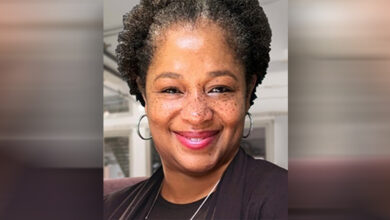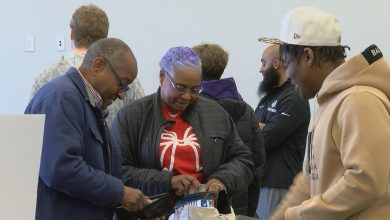BFT: A hub for Black entrepreneurs by Angel St. Jean

By Megan Sayles
AFRO Staff Writer
msayles@afro.com
Michigan native Angel St. Jean established the Black Founders Table (BFT) in 2023 to create a practical resource hub and support network for Black entrepreneurs after navigating the hurdles of launching her own tech startup, The Equity Brain Trust.
St. Jean learned firsthand the challenges of bringing an idea to market, obtaining capital and scaling a business—and when she went looking for support, she said the response from other organizations in the startup community was inadequate.
“It was more of a sense that we weren’t creating good ideas and that’s why our companies were not doing well,” said St. Jean. “I believed it was more of an issue of understanding how to take an idea through the proper methodology to turn it into a great company, and I wanted more of our companies to succeed.”

Hailing from Michigan, St. Jean moved to Baltimore with her family in 2013. Much of her career has been focused on helping organizations leverage data to drive economic development.
She started The Equity Brain Trust after facing retaliation from a former employer for speaking out during an equity, diversity and inclusion training. That former employer went on to win an award for their race, equity and inclusion work, while trying to terminate St. Jean’s employment.
She said the experience taught her that there was no benchmark for what it meant to be considered an “equitable” company.
“I had the idea to create The Equity Brain Trust as a way of creating a standard for measuring equity in organizations and helping them to see what they needed to do to improve,” said St. Jean.
After launching with an accelerator in 2020, St. Jean and her team developed a software that companies could use to assess and advance equity. During beta testing with local companies, the feedback was positive, but when they took it to the broader market, organizations were slow to adopt it. St. Jean said they were afraid to confront their own inequities.
Since then, she’s pivoted The Equity Brain Trust to focus on equity in procurement. She’s currently determining how to use her tool to help government agencies increase minority business participation.
“When I was doing my research on procurement and government, I was really struck by the statistic that Black people are about 30 percent of the population in Maryland, but we own just about 9 percent of employer firms. This means our companies aren’t scaling,” said St. Jean. “Contracts with corporations and the government are the way you can scale a company, but that’s not happening.”
As she continues to refine The Equity Brain Trust, St. Jean’s work with BFT has continued to grow. In addition to building a community for Black founders, the organization hosts co-working days, leads workshop series and engages founders in legislative policies that impact them.

Monthly, BFT’s signature activity, the Capacity to Commercialize (C2C) Roundtable, selects six founders to present their ventures to a panel of seasoned advisers who offer individualized feedback, identify gaps and connect founders to additional resources and mentorship. The goal is to help founders determine next steps for advancing and scaling their enterprises.
One participant in the BFT is Jeremy Lawson, co-founder and CEO of Salynt, a tech startup based in Washington, D.C.
“At Salynt, we designed a platform called ‘NewView,’ to help agencies and organizations simulate and understand the real-world impact of their decisions before they build it,” said Lawson. “We use artificial intelligence and virtual reality to create digital twins for urban planning, public health and infrastructure to better predict environmental impacts.”
In his experience, other organizations claimed to support Black founders but did not deliver in a meaningful way. BFT stood out to him because it truly put Black founders at the center. He said the organization bridges the divide between intention and infrastructure.
“Angel and her team aren’t charity— they provide actionable strategies,” said Lawson. “As a founder my experience runs deep in artificial intelligence, federal contracting and political strategy. I wanted to be a part of a community where we’re all playing at that level and we’re talking policy, procurement and ownership— not just pitching and hoping someone sees us.”
On behalf of BFT, Lawson said he’s sat on working groups, contributed to frameworks for measuring impacts to Black founders and spoke on panels that shape policies affecting Black entrepreneurs.
He encouraged other Black founders to join BFT.
“Black Founders Table is building something long-term. We’re not trying to just get contracts or recognition. We’re trying to build an ecosystem of accountability that helps companies scale and gain influence,” said Lawson. “If you’re a builder, a systems thinker or someone who’s tired of surface-level support, Black Founders Table is the room you want to be in.”




